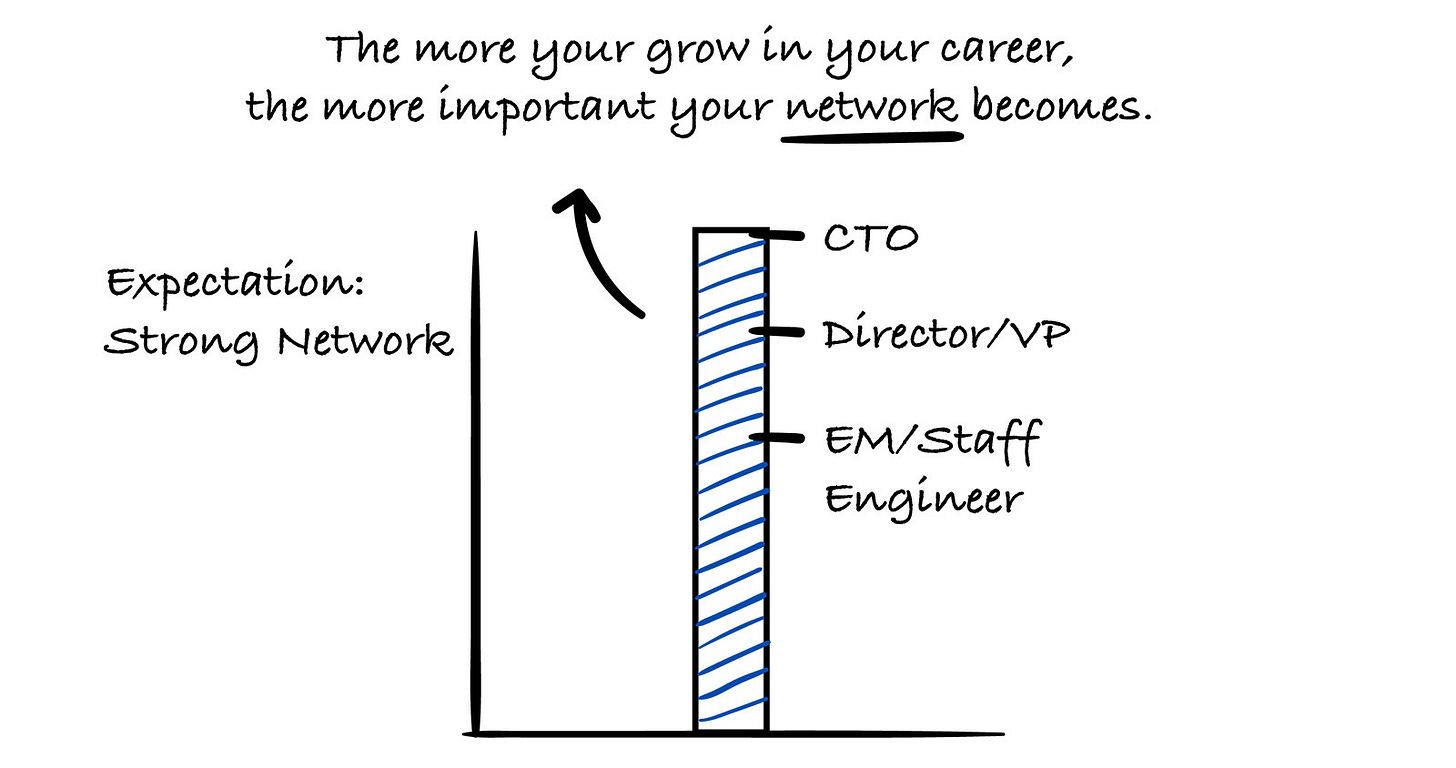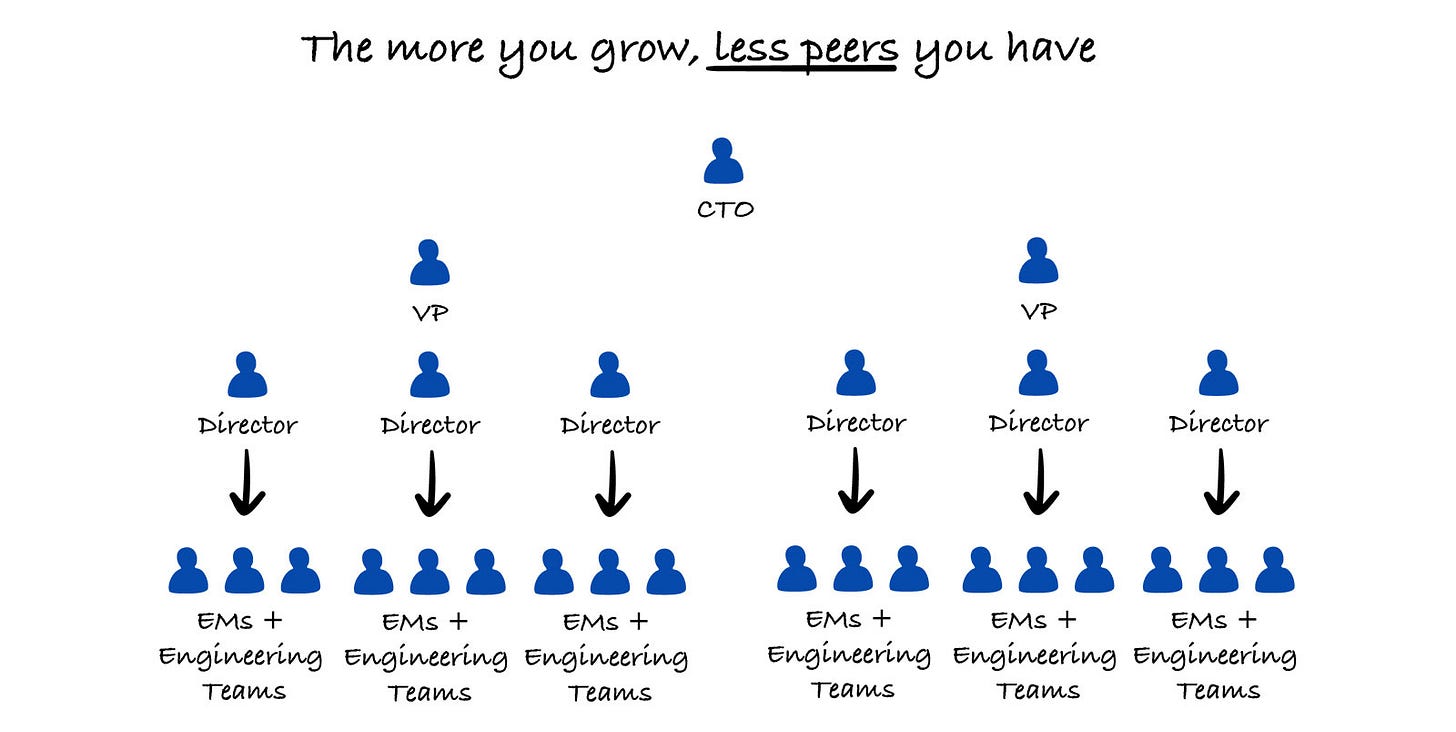Your Network is Your Asset as an Engineering Leader
As you advance in your career, your network becomes increasingly important. Here are the 3 reasons why that is the case!
Intro
You’ve probably heard about this (overused :)) term: Network is your net-worth. Well, it may be overused, but it’s definitely true, and it’s important not to dismiss it.
It’s important for everyone, regardless of their profession. However, today, we’ll dissect why, in particular, the network is crucial for engineering leaders.
My goal for today’s article is that you realize what I realized when it was already too late. When I was interviewing for an engineering leadership role, I lacked the networking aspect, so I didn’t get the role.
Make sure to read on to find out what happened!
This is an article for paid subscribers, and here is the full index:
- This Is How I Learned About the Importance of Networking as an Engineering Leader
- I Was Interviewing for the Head of Engineering Role in One of the Early Startups
- Why Your Network Is Your Asset as an Engineering Leader
- 1. Career/Job Optionality
- 2. Attracting/Retaining Talent
- 3. The More You Grow, Less Peers You Have
🔒 My Top 3 Tips for Networking
🔒 1. Networking Inside the Organization
🔒 2. Stay in Touch With Your Colleagues Even After You Move On to Another Company
🔒 3. Be Active in a Community/Attend Meetups and Conferences/Public Speaking/Writing Online
🔒 Last words
Let’s get straight into it!
This Is How I Learned About the Importance of Having a Good Network as an Engineering Leader
I grew from Senior Software Engineer to leading 3 teams of 15 people combined in a matter of 6 months. This is how it happened.
As I have mentioned in an article before, I was feeling stuck as a Senior Software Engineer, and after a while, I was lucky to have been offered a Team Lead role.
I wasn’t really convincing with my manager that that’s the path I really wanted to take, but the company was doing restructuring, and new teams were created.
I was a good candidate for the role due to my credibility inside the company and successfully finishing multiple projects, so I got offered the role, which I accepted.
I’ve made many mistakes as a first-time Team Lead, but after a couple of months, I got the hang of the role, and after 6 months, I grew to the Engineering Manager role.
I was about a year in the EM role when I started to interview with some of the other companies, and I remember one particular question that got me thinking in one of the interviews.
I Was Interviewing for the Head of Engineering Role in One of the Early Startups
I had an interview with the Founder/CEO of the company, and I got asked this question:
If we hired you today, how many great engineers could you bring with you in the next few weeks or a month?
I am trying really hard to remember how I actually responded to this question at that time (if I remembered my full response, I’ll let you know in one of the future articles), but I can’t really recall.
I remember it caught me off guard at that time, and I was probably like “uhhmmm”, “ahhmmm”, etc. :) The reason I responded that way is because I didn’t have the confidence that I could potentially bring with me some great people asap.
I had a few people in mind that I’d like to have on the team, but I didn’t think they’d be interested in joining, as they had good jobs already.
I remember thinking about this question for a while after the interview, and that was a time I deliberately decided to focus more on my network and building it.
Btw, this was also one of the reasons why I later started writing online.
Long story, short. I didn’t get that role, obviously, but this is a very important learning I got from it:
The more you grow in your career, the more you are expected to attract and also retain great talent.
Of course, this is not the only reason why your network is your asset. Let’s go next to the 3 important reasons why your network is very important.
Why Your Network Is Your Asset as an Engineering Leader
There are 3 main reasons:
1. Career/Job Optionality
This is, of course, not exclusive just to engineering leaders; it’s important for everyone. Having a good network will help you to have more opportunities than you need.
This is a very important thing to remember:
If you find yourself in a position where you need a network and you don’t have it, it’s already too late to build one.
Always keep this in mind, because you never know when you’ll need a network, especially in these current uncertain times.
When you’re reaching out to people and asking for referrals, and you haven’t talked to them for a while, there’s going to be a good chance you’ll not actually get it. Because you are just expecting to get value, without providing value first.
And that’s not the way to go when it comes to networking. You want to always start by giving value first, not just expecting to receive it.
You may be familiar with the concept of social capital. The social capital increases with people when you provide value to them. And the higher your social capital is with certain people, the higher the chance that your request will be positively accepted.
You want to increase your social capital as much as possible, with as many people as possible. Of course, not just sporadically using your energy and time unintentionally. It’s still better to have deeper relationships than shallower ones.
I’ll be writing more about social capital in one of the future articles, so stay tuned for that!
2. Attracting/Retaining Talent
As you know, the more you grow in your career, the less focus is on your pure individual contribution, but the more important the success of your projects and teams becomes. You are expected to be a multiplier for others.
And that also includes attracting and retaining great talent.
No matter if you are a Staff Engineer, Architect, or Engineering Manager, there is a certain expectation for you to be a role model for others and to bring great people to your teams that you work with + retain them.
And you know how important great talent is for a company. Meta is offering 100M signing bonuses to the people they need, and imagine if you know these people and also have good relationships with them.
This would be extremely valuable for Meta if you, as an EM, were able to bring them on. I’m sure they also offer a handsome referral bonus as well.
And last, but not least.
3. The More You Grow, Less Peers You Have
When I grew to the Engineering Manager role, I found myself in a position where I didn’t have a lot of peers to talk to anymore. We were 2 Engineering Managers at the company, each leading 3 teams, and we were both reporting to the VP of Engineering.
We had a decent relationship with the other EM. We talked regularly and we aligned on specific things + we also talked through some of the challenges and helped each other. But we were both a bit new to the role, so we missed some of the experience in specific situations.
That’s when I missed people I could talk to about specific cases regarding what the best solution is to a specific situation. And as you know, as a middle manager, there are a LOT of situations that are quite hard to deal with → you need to manage well both up and down.
And this has just shown to be true even further when I grew to become Head of Engineering, VP of Engineering, and CTO.
The further you grow in your career, the fewer peers you have and the more you need to seek people externally who can understand your problems and you can talk through with them.
That’s also one of the reasons why I am thinking of creating a more closed community around the newsletter. A community of like-minded people who are all on very similar paths and could talk through specific challenges that they are facing in their roles with each other.
Let me know if you’d be interested in that, and I’ll definitely think about it more in detail!
It’s what I missed having when I was growing as an engineering leader, and I believe that many people would benefit from it.
Now, let me share some of my top networking tips and how you can get better at it.





